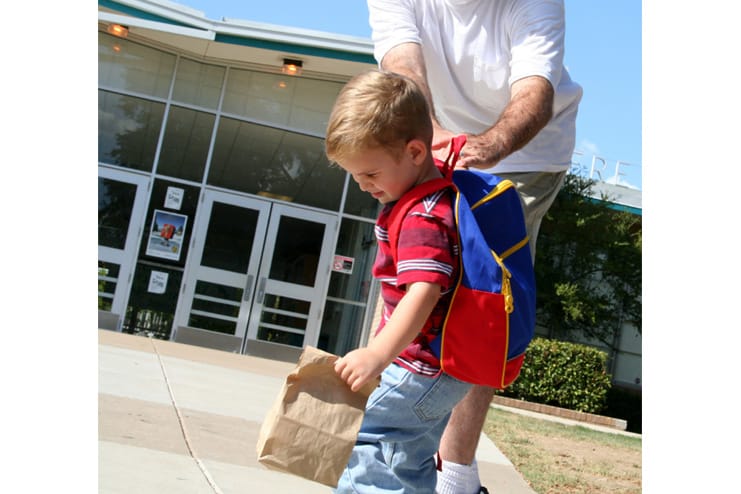Kids usually refuse to go to school after the holidays. Most of the kids complain of stomach ache right before going to school. The symptoms may disappear when they stay at home. Does your kid behave the same way?
Children find it difficult to go to school. They often make tantrums and receive beats from the parents. School refusers more often carry complaints from the schools worrying about their parents.
This article discusses the 15 things to do when a child does not want to go to school. It presents the school’s refusal behavior.
Reasons Why A Child Does not Want To Go To School?

Here are the few reasons that prevent your kid to go to school:
Reason #1: Sometimes, reluctance to school may not be permanent. If a Child has a cold or coughs for many days, discomfort and tiredness due to a severe cough may make him reluctant to go to school.
Reason #2: Children might reject going to school, if suddenly they remember that they have missed homework a few minutes before going to school. This is the major reason for the school refusal behavior in your child.
Reason # 3: Children with fatigue may refuse to go to school. Make sure that your child should have 9-10 hours of sleep daily.
Reason #4: Bullying may make your child reluctant to go to school with the fear of being bullied.
Reason #5: lack of interest in studies or learning disabilities may make him a school refuser.
Reason #6: If your child is humiliated by his/her peers. The insults made by the peers and children may lower self esteem in your child.
Reason #7: Your kid’s inability to maintain friendly social interactions may make him more anxious.
Reason #8: Expectations of the kid towards any kind of reward outside the school like playing in the playground, watching TV at home may make your child avoid going to school.
Reason #9: Some kids may not have friends at school and they experience the feeling of loneliness. This makes them avoid school.
Reason #10: Poor relationship with the teacher makes your child to often complain about the teacher saying
Is this Normal Condition?

It is a challenging task to deal with the child who does not go to school regularly. You can stay calm if you determine whether it is a normal childhood behavior or a sign of a disorder.
Here are the few steps to determine whether your child’s condition is normal or a sign of serious condition.
Step 1: Track the Frequency
There are some temporary situations which make the kids not go to school. Here are the few conditions which make your kids skip school:
- Some appealing event outside of the school
- Morning dizziness resulting from the late night parties
- Any recent fight with the peer in the school
- Pending home work or projects
Step 2: Track the intensity of their refusal
There are 3 types of intensities that children usually exhibit:
Type 1: Children of this type may express their reluctance through their actions or some may directly tell their parents.
Type 2: This type child will throw tantrums initially while getting ready for the school and may cool down once all set to go to school.
Type 3: Children of this type will fight continuously till they reach their desk and may have plans to leave school early. Some children may threaten themselves extremely.
Step 3: Observe how it impacts their life
This step helps you to determine the extent of severity of the situation.
The following things need to be evaluated in order to check the severity of the conditions and its impact on their health and daily routine:
- Evaluate whether the child is regularly missing or late to the school
- Review their academic performance and grades
- Observe whether the child is doing any threatening actions to hurt themselves to avoid school.
Step 4: Is it normal avoidance?
The above 3 steps will help in determining whether your child is facing the normal avoidance or school refusal.
Normal avoidance may have little or no impact on their life. You can relax if your child has normal school avoidance which is less frequent and not threatening.
In this scenario, proper counseling will help to make your child regular to school.
Step 5: Conclude the condition
If you notice that your child is a school refuser. Prepare yourself to stay calm without bursting out of anger. Yelling may make them avoid what you say to them.
Diagnosis & Causes of School Refusal:

Here are the few behavioral changes to consider in order to predict your child as a school refuser.
- Range of time that the child has been avoiding the school.
- Strength of child’s resistance to go to school
- Extent of distress that child has in attending the school
Causes of school Refusal:
Here are the few causes that make the child a refuser to school.
- Bullying
- Anxiety
- Lack of friends
- Family problems at home
- Sexual harassment by another student
- Acute stress disorder
Signs and Symptoms of School Refusal:

Here are the few symptoms of school refusal:
- Complaints of aches or illness just before the school time, which usually vanishes after the school time.
- Episodes of tantrums
- Show higher levels of anxiety
- Being pleaded or begged to wake up in the morning
What To Do When Your Child Does Not Want To Go To School?
Here are the few steps to follow to handle the child who is reluctant to go to school.
1. Check for Physical Causes:
If you suspect any kind of physical problems in your child check with your physician for diagnosis and treatment.
2. Identify Their Fears:
- You should recognize the potential things making your kid scared to go to school. Some of the fears that kids usually have to include:
- Social anxiety
- Fear of poor academic performance
- Fear of negative relationships
- They may fear that something bad may happen to their family members, especially if there is an ill person at the home.
Assure your child that you are there to help them in overcoming their fears.
3. Find Out The Situation:
This is one of the best ways to respond when your child does not want to go to school. Your child may be affected by the bullies in the school bus or school premises. Meet your child’s teacher to look for the solution
School refusal is a behavioral change, where the child avoids schools after a period of change like holidays, illness, starting a new school, moving from primary to high school. In these situations, parents should try to increase their child’s attendance and provide them the skills that are required to cope up with the situations of distress and discomfort.
4. Never Yell:
Instead of yelling at the kid who refuses to go to school, help them to understand the situations with positive phrases like- “I understand your concern for going to school, but I will help you to deal with the situations”
5. Help to Finish Home Works:
This is one of the best ways to motivate a child go to school. Help your child to finish homework on time. It may help your kid to stay away from the dramas avoiding school and keeps your child regular to the school.
6. Avoid Lengthy Lectures:
Don’t give lengthy lectures or make debates or discussions, which may make the situation worse. Lecturing won’t benefit your kid in any way.
7. Offer Kindness:
Offering kindness makes your kid feel more confident and it assures them that you are there as a parent to support them.
Kindness can be offered by listening to their issues and providing them reassurance with your positive phrases.
8. Set Up Daily Routines:
When your child is at home on school days, set up the daily routines similar to school:
Get and make your kid ready by school time
Limit access to TV and Internet during school hours
Reduce outing
Limit interaction till the completion of school hours
9. Create a Learning Environment:
Make sure that your kid has a safe, friendly, and connected environment in school. These things will contribute to academic achievement and success which makes them regular to school.
10. Reduce the Fun Factor:
Sometimes children want to skip school thinking that home is a better place to have some fun and freedom. What you can do in this situation is to make staying home boring! You can do this by making them away from TV/laptops and games during school hours.
11. Get Your Child Out The Door:
When your child starts complaining of headache/stomach ache in the morning. Try to figure out whether it is true or a tale. Try to get your child to the school saying that “Let’s try!I am always here to pick you up”. Once they step out for the school, they may not think of coming back home if all set at the school.
12. Use the Gentle Phrases:
Use smart and gentle phrases to let your child understand that going to school is important.
Some of the example phrases that you can use are:
- What is your biggest worry?
- Let’s have a look at today’s schedule..
- First school, then ..(anything else like movie/shopping etc)
13. Help Them Overcome Struggles:
If your child is feeling difficult to adjust to the school environment because of recent school transition or unable to make new friends help them to deal with these situations. Take your kid to the nearest park or playground and allow them to play with the kids over there.
14. Look After Yourself:
If your child is noticed to be going through school refusal, it may upset you and sometimes leaves you in anger. To look after your child you need time for yourself.
Here are the few tips:
- If you are in a better and relaxed condition, you can help your kid well. Proper rest, physical activity, and a healthy diet will help in making you cope up with the frustration.
- Never get tired in making your efforts successful.
15. See Your Doctor:
If your child frequently resists going to school and is so distressed that he/she can not stop crying and show the signs of fear like nightmare, visit the therapist concerning childhood anxiety.
Let your child understand that not going to school is not an option. It is easy to teach them the value of education and knowledge at an early stage. Right support and intervention at the right stage will help to adjust to school environment and improve academic performance.










































